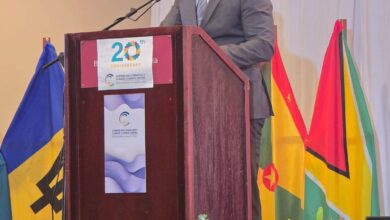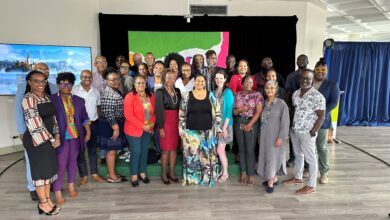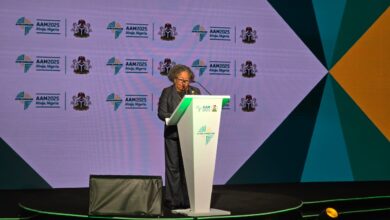The Right Honourable Prime Minister of Barbados, Outgoing Chairman of CARICOM
The Right Honourable Prime Minister of Bahamas, Mr. Hubert Ingraham, the Incumbent Chairman of CARICOM and our wonderful host;
Other distinguished Heads of State and Government;
The Secretary-General of CARICOM, His Excellency Mr. Edwin Carrington;
Ministers of Government of member countries of CARICOM;
Members of the Diplomatic Corps;
Other esteemed invited guests; Ladies, gentlemen and the people of our Caribbean civilisation.
I feel deeply honoured and privileged to be here at this formal opening of the twenty-second meeting of the Conference of Heads of Government of the Caribbean Community to speak on behalf of the people of St. Vincent and the Grenadines, and by extension, the people of the Caribbean, at home and in the diaspora.
I am a “new boy on the block” in the sense that I am here for the first time as a consequence of my party’s electoral triumph in the general elections on March 28, 2001. But I have been immersed in the politics of our Caribbean civilisation for over thirty (30) years, since my youthful days at the University of the West Indies. Over those years, I have witnessed many profound changes in the Caribbean, and internationally, in politics, economics, culture, technology, and social relations. I, too, have personally metamorphosed from “youthful radical” to Prime Minister, but still steeped and grounded in those elemental social democratic values and impulses which first propelled me into political activism. Having been beaten on the anvil of experience and forged in the cauldron of struggle, I come now to my first Heads of Government Conference of CARICOM, with dutiful respect to my distinguished colleagues, to proclaim the good news of the authenticity and nobility of our independent, distinct, and distinctive civilisation called the Caribbean.
Mr. Chairman, I see on the draft agenda for this meeting a host of weighty topics, including the Caricom Single Market and Economy; the establishment of the Caribbean Court of Justice; Regional Security issues; HIV/AIDS; organisational and functional matters relating to CARICOM; developments in Haiti; and the architecture of international relations. All of these subjects are of immense importance to this region. But they are not my focus this evening.
A Summit of this kind must begin with the assertion that we are a civilisation of a special type. We are predominantly an island civilisation occupying a particular geographic space and possessed of a shared history of European conquest, settlement, exploitation, colonialism, and empire. We have come to independent nationhood with a core of shared political values adopted and adapted from Western Europe. We share European languages spoken and written with distinctive Caribbean nuances, flair and usages. Our seascape and landscape embrace peoples drawn from diverse cultures and lands. Metaphorically, we are the songs of the Caribs, the Arawaks, and the Amerindians; we are the rhythm of Africa; the melody of Europe; the chords of Asia; and the home grown lyrics of the Caribbean itself. We in the Caribbean possess a permanence of being which goes beyond energy, will, and creative power; this permanence of being is reflected, in part, in that existential condition, not easily definable, but which we know is real, which existential condition is the living soul and spirit of our Caribbean civilisation.
The matters of functional co-operation and deepening economic integration, which have in recent years dominated CARICOM Summits and which are at the centre of this meeting, do not, in my humble opinion, rise to the challenges imposed by our manifest destiny to be one nation or determined by the consequences of globalisation, trade liberalisation, information technology, climatic/environmental changes, international crime, cultural imperialism, poverty, and the spread of HIV/AIDS.
This Summit will undoubtedly produce results to improve the lot of Caribbean people but it will not achieve nearly as much as it should unless it addresses, conceptually and practically, a central historical problem of regional integration efforts which is their tendency to integrate state systems, not peoples or the Caribbean civilisation.
The failed West Indian federal experiment emphasised the establishment of formal governmental institutions which were isolated from the people; CARICOM has focused on trading arrangements and the efficacy of the Secretariat; and the OECS has as its raison d’etre eighteen areas of functional cooperation. All of these have been important and, at the second remove, touch, and connect with, the people but in none of these unity frameworks has the issue of the freedom of movement of people been favourably addressed or the travel of Caribbean people from one regional country to another been made hassle free.
Indeed, while the technology and availability of regional transport, air and sea, have made it easier for intra-Caribbean travel, the contemporary states in the region have put immigration barriers in place which have made it more difficult than in colonial times for a national of one Caribbean country to enter another. It even goes further than this: Guyanese visitors are, by and large, looked upon with grave suspicion by the immigration authorities of sister CARICOM countries; Americans and Canadians are welcomed with open arms in Barbados whilst St. Lucians and Vincentians are generally treated as unwanted strangers at the gates; Rastafarians are instinctively discriminated against by the immigration and customs officers in practically every country in the region, possibly save and except Jamaica; and Barbadians are caricatured as “smart men” who must be watched closely at ports of entry and beyond. All this is totally unacceptable. Neither CARICOM nor some other form of union can truly survive these indignities and irrationalities. To be sure, Caribbean governments have sought to lessen these hardships in the case of graduates of Caribbean universities and other selected categories of professionals. But, useful as this is, it has regrettably strengthened the impression in the minds of ordinary Caribbean folk that “this integration business” is for the elite. Unless and until a thorough-going pro-active programme of encouraging intra-Caribbean travel and residence is devised by Caribbean governments, regional integration would not command the requisite degree of popular support as it should.
I call, therefore, for a people-to-people integration of the region. Certain immediate steps must be taken. First, let us abolish, on a reciprocal basis, the requirement for a passport or other such travel document to enter or leave any of the States of CARICOM and remove the legal hurdle of residence and work permits for citizens of the respective states to live and work in any other. I am satisfied that the bulk of the people in the Caribbean are inclined to support these propositions. The politicians must not be seen as encumbrances to the people in this regard. I urge civil society to speak forcefully on these matters so that the people’s voices would be heard loudly in the citadels of power and the councils of CARICOM.
To me, it is inconceivable to speak of a Single Market and Economy without a freedom of movement of peoples. How can the market and the economy be single and unified but the workers are still trapped in their territorial, homeland bases?
Similarly, I am yet to be persuaded that it is quite in order to build a judicial superstructure entitled the Caribbean Court of Justice, which envisages the abolition of the Privy Council as the final appellate authority, but leaves the base, the Magisterial Courts’ system in shambles.
The ordinary folk in the Caribbean seek judicial redress at the Magistrates’ Courts in over ninety percent (90%) of the cases. Yet, Magistrates are basically at the mercy of the Executive; few have security of tenure, and there is unwholesome interference in their work. Why not unify and strengthen the Magistracies across the region and so lay the basis for an easy public acceptance of the superstructural edifice of the Caribbean Court of Justice? This, of course, does not affect the legitimacy of the argument for the Court in its original jurisdiction to aid in the more efficacious functioning of the Caribbean Single Market and Economy.
I share the vision, the ideal of a final Caribbean Court of Appeal as befits our Caribbean civilisation but we must proceed to it in such a manner as to engender public confidence in the enterprise as an essential flag-bearer for the delivery of quality justice. I am not satisfied that we are so doing.
In a speech in St. Lucia on June 18, 2001, on the occasion of the 20th Anniversary of the OECS, I mapped out a framework for, at the minimum, a confederal political union of that sub-region. I now make a similar call for a confederal political arrangement between member-states of CARICOM. Our Caribbean civilisation and the contemporary circumstances of our regional political economy demand, a more profound political expression, institutionally. About this we ought to entertain no doubts. This quest for a deeper union is a cause vital to our progress and cannot be won by doubtful men and women. Let us again put the issue of political union on the agenda and proceed to it with measured practical steps which truly mean something to the people of the region. For my part, it is a noise in my blood, an echo in my bones!
So, let’s go forward in this vein, TOGETHER NOW!
THANK YOU!





